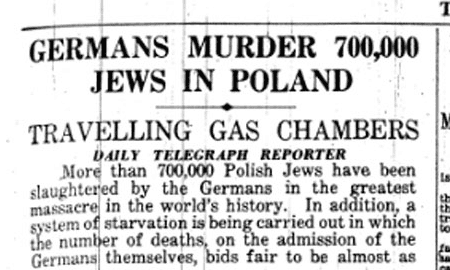As the Nazi party rose to power in Germany, they persecuted Jews among other groups. Not only were synagogues and Jewish peoples' homes burned, but thousands of Jews were placed in concentration camps. The only way to escape persecution was to flee the country.
The US response to Germany's extreme violence against the Jews was quite lacking. Like many other countries, it did not allow Jewish refugees from Europe. In 1939, 83% of Americans opposed the idea of welcoming Jewish refugees into the country. Due to the Great Depression, Americans feared that immigrants would harm the American economy since they would need financial support from the government. President Herbert Hoover created a policy that significantly decreased the immigration rate into the US due to the restrictionist sentiment after the stock market crash.
 Along with the immigration problem, Americans had feelings of fear and mistrust towards Jewish people. These public opinions were rooted by Charles Coughlin, known as the "radio host," who spoke out to millions of Americans about religion and also preached anti-Semitism, accusing Jews of manipulating financial institutions. His anti-Semitic messages ingrained American hatred towards Jews, causing them to be less likely to help them out in their time of struggle.
Along with the immigration problem, Americans had feelings of fear and mistrust towards Jewish people. These public opinions were rooted by Charles Coughlin, known as the "radio host," who spoke out to millions of Americans about religion and also preached anti-Semitism, accusing Jews of manipulating financial institutions. His anti-Semitic messages ingrained American hatred towards Jews, causing them to be less likely to help them out in their time of struggle.Amid the anti-Semitism in America, some Americans tried to help the Jews in Germany. American Jewish leaders boycotted German goods to pressure Hitler into ending his anti-Semitic policies, the Roosevelt administration agreed to loosen the immigration policies, and President Roosevelt created a War Refugee Board to develop rescue projects to save 200,000 Jews.
Although some action was taken by the US to help the Jews persecuted in Germany, the American sentiments of anti-Semitism resulted in an inadequate response to the extreme persecution of Jews in Germany. Additionally, the American public lacked awareness of what was going on, as Americans only fully learned the extent of the extermination after the Allied armies freed the Jews from concentration camps after the war ended. To this day, discussions arise about what we could have done.
https://www.history.com/topics/world-war-ii/american-response-to-the-holocaust
https://depts.washington.edu/depress/anti_semitism_jewish_transcript_seattle.shtml
https://www.facinghistory.org/defying-nazis/america-and-holocaust
https://encyclopedia.ushmm.org/content/en/article/the-united-states-isolation-intervention
The history of anti-semitism in the US is a dark part of our past. The lack of aid that the US lended to Jewish immigrants definitely leads to the "what if" question. Another incident that I thought was relevant to your post was that of the SS St. Louis. In 1939, this ship carried 900 Jewish immigrants who were fleeing from Germany to the US. They planned to stop at Cuba and then continue onto ports at Florida. However, both the Cuban and US government rejected the Jewish immigrants. FDR's administration cited the immigration quota as the reason for rejecting the ship, but it was clear that the anti-Jewish sentiment throughout the country influenced this decision. The ship was forced to sail back to Europe. This incident reinforces the information in your post about how the US did not do all it could have done to help the Jewish, largely due to prejudice.
ReplyDeletehttps://www.britannica.com/topic/MS-St-Louis-German-ship
People seem to forget over and over that America has a huge legcy of anti-semitism. There was actually a large Jewish community in Shanghai, China, because China was willing to accept the Jewish people when the US refused. Those people later came to the US after facing anti-semitism in China. Just last year the US had a huge shooting at a synagogue in Pittsburgh, killing 11. The anti-semitic past of the US isn't 100% in the past.
ReplyDeletehttps://www.nbcnews.com/news/us-news/tree-life-synagogue-deadly-shooting-n925291
I think it's very important to be reminded that anti-semitism is another dark part of American history. I remember talking about Coughlin in class, but I wanted a reminder so I looked him up. He was an isolationist, and according to the article I read, he claimed that Jews had planned the war for their own benefit and "conspired" to get the U.S. involved. Then after Pearl Harbor, as war sentiment began to change, Coughlin's isolationist position became less popular. He was reported to be "pro-nazi" and the FBI raided his church and seized parish papers and personal records. The government had been keeping an eye on him even before the bombing.
ReplyDeletehttps://encyclopedia.ushmm.org/content/en/article/charles-e-coughlin